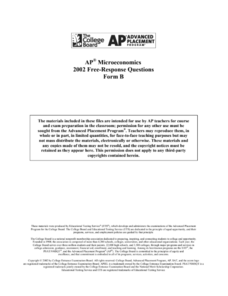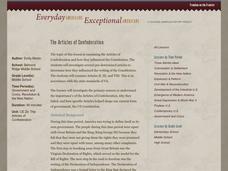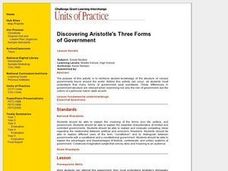College Board
2007 AP® Microeconomics Free-Response Questions Form B
In many industries, one company has a monopoly or has government assistance. How does this affect profits and the economy at large? A set of problems from College Board explores this.
College Board
2002 AP® Microeconomics Free-Response Questions Form B
The government catches a firm in the act of polluting. What will happen to the company's profits? Learners consider the question and others using authentic College Board materials. Other problem sets examine wages and labor and price...
College Board
2005 AP® Microeconomics Free-Response Questions Form B
A rabies vaccine company has a monopoly, but fluctuations in wages are impacting its profits. A series of questions from College Board considers the problem. Other practice questions include an examination of price and output curves and...
Curated OER
Three Branches, One Goal
Helping teenagers defend their beliefs with a foundational understanding of government structure.
Curated OER
The Three Branches of Government
Students write about working in one branch of government. For this branches of government lesson, students read about the three levels of government using various websites and then work in groups to discuss, illustrate and write about...
Curated OER
Democracy and Representative Government
Students complete a worksheet about the government and identify the characteristics of different governments. In this government lesson plan, students define representative democracy and complete a worksheet.
Curated OER
The Three Branches of Government
Students complete a unit on the three branches of government. They compare/contrast the three branches of government, write a letter or e-mail to an executive in the Federal Government, and develop outlines for historical documents.
Curated OER
Letters to the Government
Seventh graders examine how to be active participants in their local, state, or federal governments. They create a powerpoint presentation and write a letter to one of their governmental representatives about a problem and solution of...
Roy Rosenzweig Center for History and New Media
The Articles of Confederation
Have you ever started a project only to realize you need to scrap it and start over? Scholars analyze the issues leading to the fall of the Articles of Confederation. A group investigation into Articles II, III, and VIII unveil the...
National Endowment for the Humanities
Lesson 4 James Madison: Internal Improvements Balancing Act—Federal/State and Executive/Legislative
Who has the power? The founding fathers asked the same question when the United States was formed. Learners explore issues that arose during Madison’s presidency that raised constitutional questions. Through discovery, discussion, and...
Curated OER
Differing Federal Responses to the Great Depression: Letter Analysis
Young analysts examine two letters, one written by President Hoover and one written by FDR. Each letter contains that president's response to the role of the Federal Government during times of crisis (The Great Depression). They analyze...
Curated OER
What is the Federal System Created by the Constitution?
Explore the unique structure of the federal system of government in the United States. Class members will learn about how most nations were organized before the establishment of the Constitution, how power is currently divided between...
Center for History Education
Breaking the Great League of Peace and Power: The Six Iroquois Nations During and After the American Revolution
What happens when you can't remain neutral? An informative lesson explores the impact of the American Revolution on the Iroquois Nations. Scholars learn about the six Iroquois nations and their treaty with the newly formed American...
Curated OER
What is Government?
Students explore values that unite Americans. In this government lesson, students recall the symbols of America and discuss how to create a "Classroom Constitution." Students form rules and write their own Constitution.
Curated OER
Following the Leaders
Examine the historic election of Pope Benedict XVI and reflect on the challenges he faces as the new leader of the Catholic Church. This New York Times lesson investigates how other world leaders are chosen in different forms of...
Curated OER
Compare the United States Government with Other Political Systems
Students explore the U.S. form of government and illustrate other forms of government found throughout the world. They explain the similarities and differences between the U.S and other governments.
Curated OER
Discovering Aristotle's Three Forms
Learners, working in small groups, role play different kinds of governments--oligarchy, monarchy, dictatorship, and democratic republic. They portray their form of government in a skit, while other groups guess which kind of government...
Curated OER
Types of Government
Students explore different types of government. In this government lesson plan, students discuss the role of government in modern society, identify different types of modern governments, and play a game based on the information gleaned...
School Improvement in Maryland
Political Systems: Advantages and Disadvantages
Every political system has advantages and disadvantages. To gain an understanding of these differences, groups investigate the political system of another country—oligarchy, monarchy, dictatorship, parliamentary—and prepare a...
Curated OER
Why Do Governments Exist? Locke, Hobbes, Montesquieu, and Rousseau
Here is a great secondary source reading that includes the primary ideas and philosophies of the famed Enlightenment philosophers: Thomas Hobbes, John Locke, Charles Montesquieu, and Jean-Jacques Rousseau. In additional to discussing...
Curated OER
Civics Test for Citizenship: History and Government (51-100)
Use this presentation to help English learners prepare for their upcoming citizenship test. It includes questions 51-100 from the History and Government section of the exam (questions 1-50 can be found in a different presentation, linked...
Curated OER
7th Grade Social Studies: Test Release Items
Test release items can be a big help for getting the class ready for the end of the year state exams. Prep your 7th graders with 30 release questions in PowerPoint form. Questions cover US government/civics, US geography, and US history.
Curated OER
Critical Thinking About Government
Students research the Comox Band's system of government and report on what kind of government they think would work for them. In this government lesson plan, students decide between a hereditary system or an election system of...
Curated OER
Forming A Government
Students simulate being on an island after their ship has wrecked, or their plane has crashed. Food, fresh water, and shelter are in short supply. They must form a government, develop laws and penalties.
Other popular searches
- Compare Forms of Government
- World Forms of Government
- Ancient Forms of Government
- Four Forms of Government
- Forms of Government Rating=3
- Many Forms of Government
- Forms of Government 2nd
- Forms Government Lesson Plans
- Different Forms of Government
- Forms of Government Intervent
- Greek Forms of Government
- Forms of Government Inter Vent

























